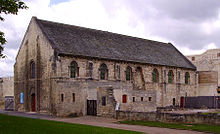Exchequer of Normandy


You can help expand this article with text translated from the corresponding article in French. (December 2008) Click [show] for important translation instructions.
|
The Exchequer of Normandy (Échiquier de Normandie) or Exchequer of Rouen (Échiquier de Rouen) was the exchequer of the Duchy of Normandy.
According to the Dialogue concerning the Exchequer, in the late twelfth century there were competing views as to the origins of the English Exchequer, with some arguing that it was an Anglo-Saxon institution and other that it post-dated the Norman conquest, but none arguing that it originated in Normandy. By the time of the Dialogue, however, there was an exchequer in Normandy.
In 1315 the Norman Barons pressed a new charter, the "Charte aux Normands" on Louis X of France with the result that the decisions of the Exchequer of Normandy was declared final, meaning that Paris could not overturn decisions made in Rouen and that the King could not raise a new tax on the Normans without their approval.[1]
The Exchequer of Normandy was later superseded by the Parliament of Normandy in 1508.
Sources
- Encyclopédie ou Dictionnaire raisonné des sciences, des arts et des métiers by Diderot & d’Alembert, vol. 5, p. 260.
References
- ^ Powicke, Maurice. The Loss of Normandy: 1189 - 1204 ; Studies in the History of the Angevin Empire. Nabu Press. p. 272. ISBN 978-1173182311.
- Amable Floquet, Essai historique sur l'Échiquier de Normandie, Rouen, Édouard Frère, 1840.
